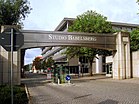Potsdam, Germany
| Potsdam | |||||||
|---|---|---|---|---|---|---|---|
From top: The City Palace with St. Nicholas' Church in the background,
Sanssouci palace, Potsdam New Palace, Dutch Quarter and Filmstudio Babelsberg |
|||||||
|
|||||||
| Coordinates: 52°24′N 13°4′E / 52.400°N 13.067°ECoordinates: 52°24′N 13°4′E / 52.400°N 13.067°E | |||||||
| Country | Germany | ||||||
| State | Brandenburg | ||||||
| District | Urban district | ||||||
| Government | |||||||
| • Lord Mayor | Jann Jakobs (SPD) | ||||||
| Area | |||||||
| • Total | 187.28 km2 (72.31 sq mi) | ||||||
| Elevation | 32 m (105 ft) | ||||||
| Population (2015-12-31) | |||||||
| • Total | 167,745 | ||||||
| • Density | 900/km2 (2,300/sq mi) | ||||||
| Time zone | CET/CEST (UTC+1/+2) | ||||||
| Postal codes | 14467–14482 | ||||||
| Dialling codes | 0331 | ||||||
| Vehicle registration | P | ||||||
| Website | www.potsdam.de | ||||||
Potsdam (German pronunciation: [ˈpɔtsdam]) is the capital and largest city of the German federal state of Brandenburg. It directly borders the German capital Berlin and is part of the Berlin/Brandenburg Metropolitan Region. It is situated on the River Havel, 24 kilometres (15 miles) southwest of Berlin's city centre.
Potsdam was a residence of the Prussian kings and the German Kaiser, until 1918. Its planning embodied ideas of The Age of Enlightenment: through a careful balance of architecture and landscape Potsdam was intended as "a picturesque, pastoral dream" which reminded its residents of their relationship with nature and reason.
Around the city there are a series of interconnected lakes and cultural landmarks, in particular the parks and palaces of Sanssouci, the largest World Heritage Site in Germany. The Potsdam Conference in 1945 was held at the palace Cecilienhof.
Babelsberg, in the south-eastern part of Potsdam, was a major film production studio before the 1930s and has enjoyed success as a major center of European film production since the fall of the Berlin Wall. The Filmstudio Babelsberg is the oldest large-scale film studio in the world.
Potsdam developed into a centre of science in Germany in the 19th century. Today, there are three public colleges, the University of Potsdam, and more than 30 research institutes in the city.
...
Wikipedia








